Medieval, Renaissance and Skeptical Philosophy
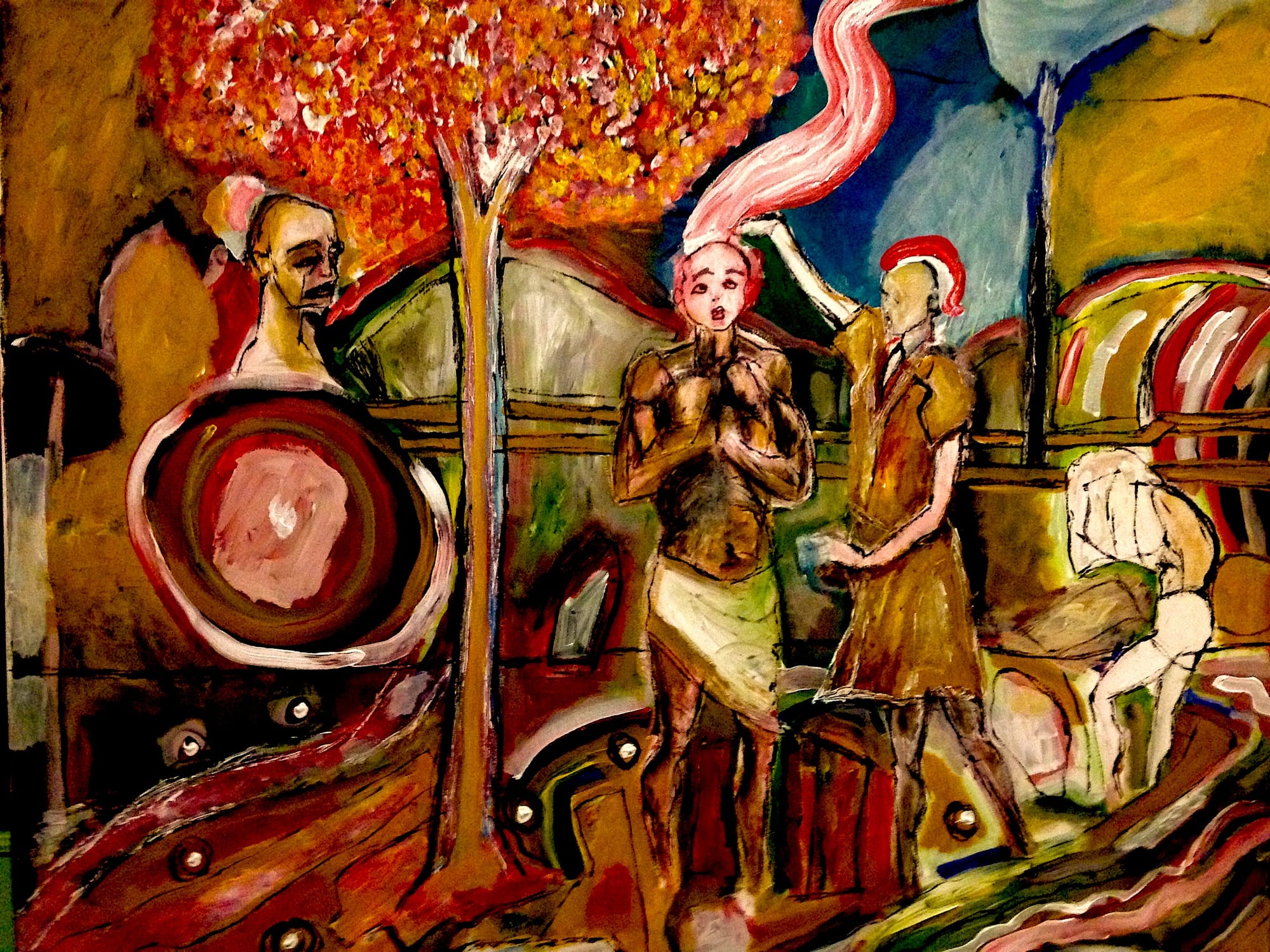
Interview by Richard Marshall
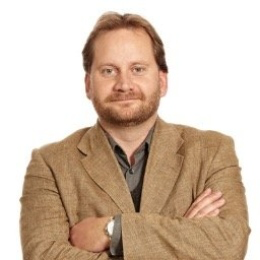
'The term ‘Renaissance philosophy’ is particularly useless. It just does not serve any purpose. Is philosophy that starts with Petrarch in the 14thcentury the beginning of the Renaissance? No, there is nothing new that begins then. Petrarch had a certain influence on some later thinkers in the 15thand 16th centuries, but it does not make any sense to delineate a new period in history that starts then.'
'There is no way of drawing a medieval and early modern distinction between Grotius and Hobbes on the one hand as modern philosophy and Suárez on the other as medieval.'
'The only reason Descartes was singled out as the father of modern philosophy was because no one ever read anything other than Aquinas and if you compare those two, of course, Descartes looks new and feels fresh.'
'Concept formation is ... discussed throughout the middle ages and has several similarities with 20th century philosophy of mind. That also applies to mental language-theory, of course, which is very similar to the language of thought tradition in the late 20thcentury. Even Fodor himself commented on that.'
'An interesting aspect of 14thcentury discussions of the passions were the so called ‘passionless passions’, as Peter King has called them. It is passions of the will – an intellectual love of god, for example.'
'Mental language as it was developed by William Ockham seems to have been a kind of medieval functionalism serving as both psychological entities caused by our interaction with our environment and as linguistic entities in a language – the language of thought, which underlies all spoken and written languages.'
'My interest in skepticism derives partly from my interest in this distinction and how it plays out in the middle ages. It can be said to be an interest in how the other side, the epistemological/non-Aristotelian side, developed.'
Henrik Lagerlund works on the history of philosophy; primarily on Medieval and Renaissance philosophy, but he has also written on Aristotle and Leibniz. He has just finished writing a history of skepticism for Routledge. Here he discusses why the distinction between Medieval and Renaissance philosophy is useless, the importance of Francisco Suárez, Descartes, medieval philosophy of mind and action and its reliance on the Ancients, medieval philosophical psychology, the mind/body problem as understood by the medievals, passions and ethics, Richard Rufus of Cornwall, medieval mental language, logic, medieval theories of representation and Avicenna, the development of skepticism, Buridan’s ‘fallibilism’, Lady Mary Shepherd and contemporary philosophers and contemporary debates about skepticism - and an aside about Wittgenstein.
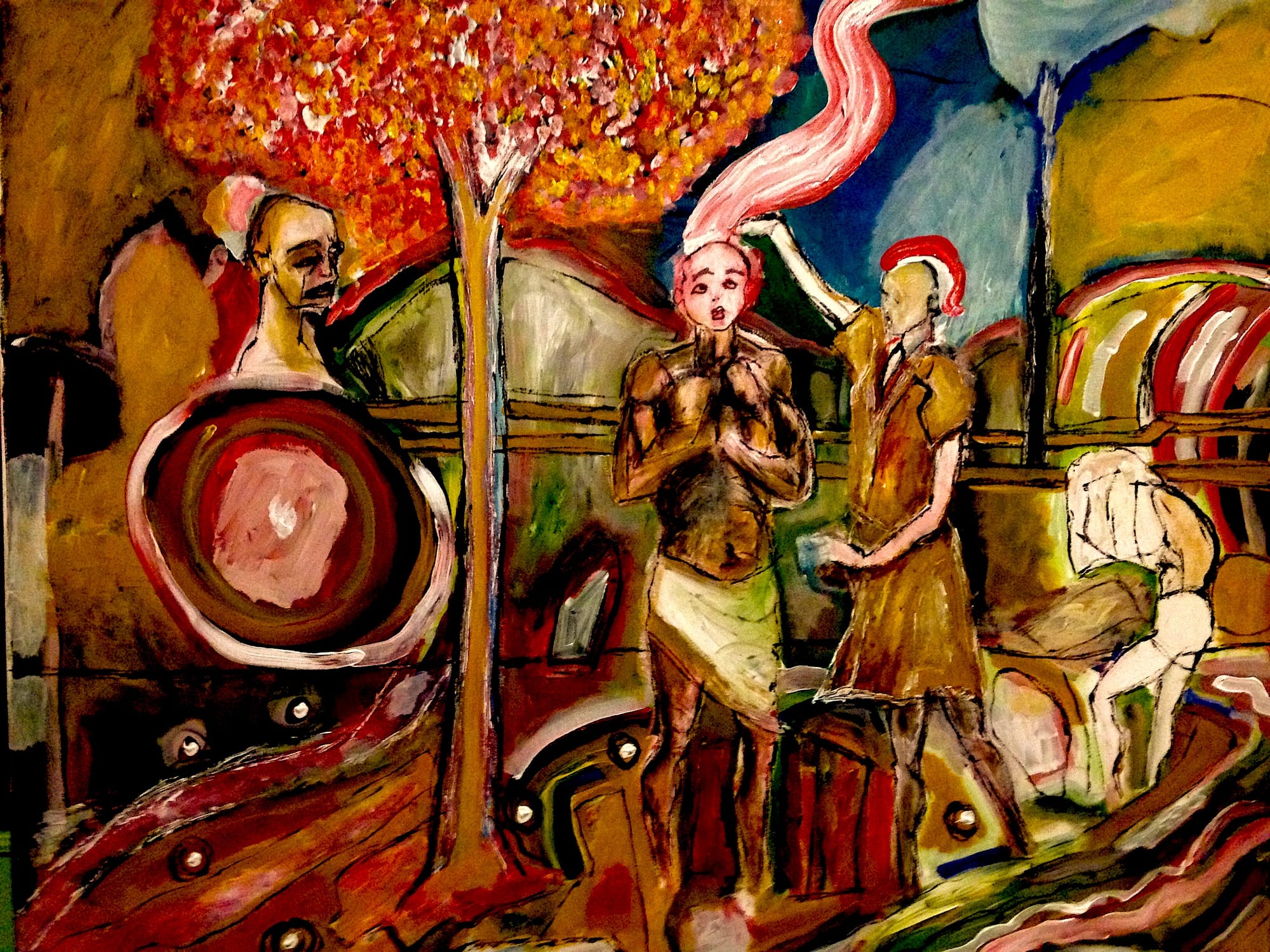
3:16: What made you become a philosopher?
Henrik Lagerlund: I didn’t come from an academic background. My parents were both working class and philosophy was never part of my life growing up. Their idea was that I would become a medical doctor or an engineer. I did actually get a degree in engineering before giving that up to study philosophy. I was a very bookish boy and read everything I could get my hands on, mostly novels and history. I had early a strong interest in history, but my dream was always to become a novelist – not really an academic. I went to Uppsala in the early 90’s to study literature and creative writing, but ended up taking a course in philosophy. It was immediately as if I had arrived where I belong. Even though I didn’t realize it until much later it was in particular a book by the Finish philosopher G.H. von Wright called Science and Reason (although it was only published in Swedish) that drew me in. He had a way of placing deep and contemporary problems in a historical context that I still admire to this day. It is not really a book aimed at academic philosophers, but it aims to understand the historical background to scientific rationality as it was formed in and after the Enlightenment. I have also much later come to realize that much of my own work on medieval philosophy has been motivated by him.
At the Uppsala philosophy department in the 90’s most research was on logic. I started working with Krister Segerberg, who was the chair of theoretical philosophy at the time and it was natural to then work on something related to modal logic which was his area of reseach, but I was really seeking to combine my interest in history with logic and meeting Simo Knuuttila allowed me to do that. I worked with him in Helsinki for a period and was able to finish my dissertation in 1999 on Modal Syllogistics in the Middle Ages. It became my first book, which was published by Brill in 2000.
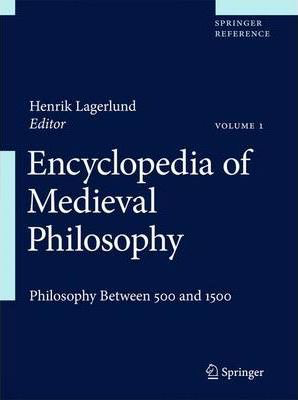
3:16: You’re an expert in that period of philosophy that is usually seen as stretching between scholasticism and early modernism but you don’t think that’s a particularly useful distinction and that it oversimplifies the situation. So to start with can you say something about your specialized area of philosophy and why that familiar distinction shouldn’t dominate the way we think about it? Are you saying that there really wasn’t a Renaissance in the sixteenth century, for example?
HL: I realize that the distinctions we have within our profession that separate ancient, medieval and early modern philosophy serve a purpose, but other than political or pedagogical they have no real use in my mind. They provide us with a false picture of the history of philosophy. There are never any sharp breaks in history, instead, changes come gradually. I think it is fine to use these historiographical tools but one must realize that they are mere conventions that we impose on history and that they can only be more or less probable. I am a skeptic when it comes to historiography or as a reader. The proposal I wrote together with Benjamin Hill for The Routledge Companion to Sixteenth century Philosophy was called: “historiographical nihilism”. I have a paper working this out that is not published yet.
The term ‘Renaissance philosophy’ is particularly useless. It just does not serve any purpose. Is philosophy that starts with Petrarch in the 14thcentury the beginning of the Renaissance? No, there is nothing new that begins then. Petrarch had a certain influence on some later thinkers in the 15thand 16thcenturies, but it does not make any sense to delineate a new period in history that starts then. Philosophy in general goes on much as it has been before him. As Brian Copenhaver shows in his opening article in the Routledge Companion humanism can be questioned as a movement as well. If you are going to impose these historiographical concepts on history you always have to define it in some way that inevitably will impose a false narrative on history. This is why I chose to pick certain dates and call whatever looks like philosophy between those dates for medieval philosophy. This is the approach I take in the Encyclopedia of Medieval Philosophy. It covers philosophy between 500 and 1500, and for lack of a better term we can call that medieval philosophy.
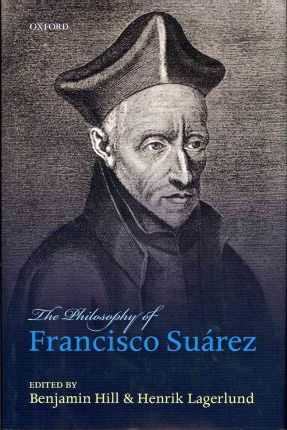
3:16: The seventeenth century philosopher Francisco Suárez is an important philosopher who has perhaps been missed because he doesn’t fit the dichotomy, yet he seems important in terms of his approach to free will and to coercive powers and the state. Hobbes saw his approach to philosophy of action as a threat to his approach didn’t he? – and the Hobbesian approach seems to be the one contemporary philosophy is more used to discussing. So what was Suárez arguing that was so disturbing to Hobbes – and if the scholastic/modern dichotomy no longer holds, how should we characterize this debate between these two?
HL: Yes, Suárez is enormously important and for far too long neglected. There is much more work being done now on him than preciously particularly in English. There has been a Spanish scholarly tradition on Suárez for much longer, but we are only now realizing his importance in the English-speaking world. As you indicate he does not easily fit into our traditional distinction between medieval/renaissance and modern or early modern thought. There are elements of his thinking that are similar to Hobbes and Locke or the natural law thinkers Hugo Grotius and Samuel Pufendorf, but there are other aspect that are closer to Thomas Aquinas.
I certainly do not think that the differences between Suárez and Hobbes fall back on a distinction between medieval and early modern philosophy. They both defend the idea of a social contract, but slightly different versions, and they defend completely different views of freedom and free will – Suárez is closer to Descartes while Hobbes rejects freedom. Suárez also uses an idea of final cause while Hobbes rejects it. As mentioned already, Suárez defends a view of natural law that clearly preceded and influenced Grotius. There is no way of drawing a medieval and early modern distinction between Grotius and Hobbes on the one hand as modern philosophy and Suárez on the other as medieval. Any attempt to do so will violate their thinking and force them into a mold that they do not fit.
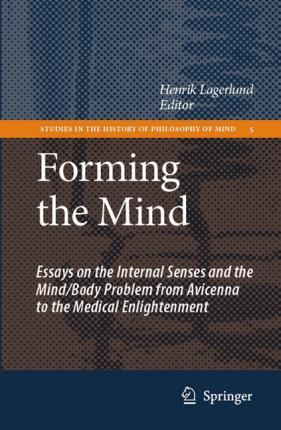
3:16: So this lets us segue to your revisionary thinking in the history of the philosophy of mind and philosophical psychology. Descartes used to be thought as starting the ball rolling, but now we think this isn’t right. So how would you say we should think about the origins of philosophical psychology and mind? How important, in particular, are Arabic , Islamic and Jewish orientated philosophers in this?
HL: I would say most, if not all, of the themes that we attribute to Descartes account of mind as it was developed in the Meditations can be found earlier in history. The way he puts them together is uniquely Cartesian, however, but none of the elements themselves are. Calvin Normore teaches his medieval philosophy course at UCLA by starting with Descartes. He then picks up a theme from him and traces it through the middle ages up to Descartes time. It is a very original way of teaching medieval philosophy. It would make for a good book.
The only reason Descartes was singled out as the father of modern philosophy was because no one ever read anything other than Aquinas and if you compare those two, of course, Descartes looks new and feels fresh. Medieval philosophy takes on a new turn after the critique of Aristotle in the late 13thcentury and early 14thcentury. The 14thcentury in Western Europe is an extremely interesting time in philosophy. It is there we see the emergence and perhaps testing of ideas that come to form western philosophy in the 17thcentury.
Speculations about animal and human psychology or philosophical psychology is very old and date back at least to Aristotle. It was taken in a bit different way by Augustine and several themes in Descartes are Augustinian. The western medieval discussion of psychology was first heavily influenced by the translation of Avicenna into Latin. He had a huge impact on western philosophical psychology. Avicenna combines Aristotle and Plato in an interesting way and because of that there are similarities between him and Augustine, although there is no known influence on Avicenna by Augustine. They both emphasizes the human soul’s self-reflection and argue for a strong notion of a self in humans. It was not until the 13thcentury that western philosophy became really familiar with Aristotle’s account of the soul, which is quite different. It was interpreted through the lens of Avicenna in the beginning. Even though the faculty psychology is not at all as explicit in Aristotle it became standard through Avicenna and remained there.
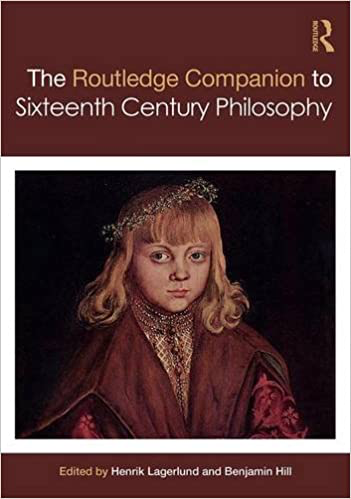
3:16: How important to medieval philosophy of mind and action are the ancients and their philosophical psychology? Given that scholarship is giving us reasons for not dividing the medieval and moderns quite as sharply as we liked to do, is there a similar case for saying that ancient/medieval divisions are similarly less secure? Or, to put it another way, what makes medieval psychology different from the ancients?
HL: I would not want to make a sharp distinction between ancient and medieval philosophy, at least not as it was traditionally drawn up where Augustine is considered to be a medieval philosopher. I see him as a late ancient philosopher. He clearly belongs in the ancient world. There is a natural way of drawing the distinction in western philosophy between ancient and medieval philosophy since there was a real break and sharp decline in philosophy after the fall of the western Roman Empire. That marks for me a break between western ancient and medieval philosophy. Philosophy starts up again in the age of Charles I when there again is need for educated people outside of the monasteries.
Some scholars want to draw the distinction between ancient and medieval philosophy via the introduction of the Abrahamic religions. It makes much more sense for the Arabic or Islamic philosophical tradition, but much less so for the Judaic and Christian traditions. Sometimes I draw the distinction for my students with the help of the languages philosophy was written in during the middle ages. It is the philosophy in Arabic/ Persian, Latin, Hebrew and Greek (Byzantine philosophy). It is not easy to draw these distinctions. It Is better really to set up arbitrary dates, but any way of trying to divide up the history of philosophy is as suggested above arbitrary.
As far as philosophical psychology is concerned, I do think the introduction of Christianity plays a role since almost all philosophers in medieval times started to worry about the immortality of the soul, i.e. personal immortality. It introduces a special problem which leads to what we come to know as the problems of dualism of mind and body. John Buridan, the important 14thcentury Paris Master, plays a significant part in this debate since he introduces three ways of interpreting the relation of the mind to the body. He calls these Averroes, Alexanders and the Christian positions. They are the same as the views discussed in the early 16thcentury by Pietro Pomponazzi. Averroes position is the one where the intellectual soul is one and we share in this soul when we think. Alexander’s is a kind of materialism where the mind is extended and dies with the body. The Christian position is a kind of substance dualism not unlike Descartes’. These views set the context of the debate about the human soul/mind up until Descartes.
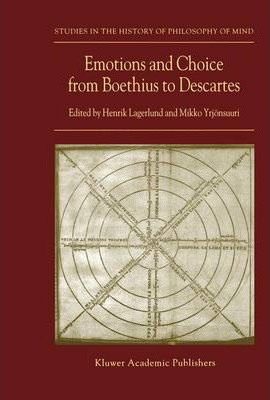
3:16: So what are the main components of medieval philosophical psychology and what are the main contrasts with modern conceptions?
HL: Medieval philosophical psychology is a very rich area and there are many aspects to it, which are hard to do justice to in a short answer. I will mention a few aspects. Sense perception is one central part, which goes through several different but intense debates from the 12thcentury through the 14thcentury. Many of the themes developed by medieval philosophers are similar to themes found in 17th century empiricism, but also to themes in 20th century empiricism, particularly as empiricism was developed by Russell. Another important part of medieval philosophical psychology is their treatment of internal senses, which derived from Avicenna. Faculty psychology as developed in the late 19thcentury has many similarities with the medieval discussion, but also with later discussions of so-called modularity of the mind in the late 20thcentury. Concept formation is a third area that is discussed throughout the middle ages and has several similarities with 20thcentury philosophy of mind. That also applies to mental language-theory, of course, which is very similar to the language of thought tradition in the late 20thcentury. Even Fodor himself commented on that.
Intentionality is another idea that was central to the medieval discussion and is equally central to the 20thcentury discussion. As many already know, the terminology as well as the concept was introduced into the 20th century by Franz Brentano. He makes no secret of the fact that he in turn borrowed it from the middle ages. As he uses it, it is also very similar to some parts of the medieval discussion, but as the problem of intentionality has developed in 20th and 21st century philosophy of mind, it has become a problem of how a mind or brain can have content. This is, however, not a problem for medieval philosophers, since they assumed or took it for granted that a mind/intellectual soul has content. Their problem was instead how it got that content.
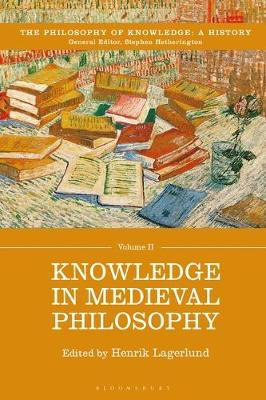
3:16: How did this approach make a difference to the mind/body problem as understood by the medievals compared to how we think of the problem these days?
HL: As I understand it, there are actually several mind/body problems. The most famous one is the one we often derive from Descartes and his correspondence with Princess Elizabeth. It has to do with the interaction between the mind and the body. There is another problem related to this which Descartes also addresses, namely the union of mind and body. Both of these were discussed in the middle ages. Many medieval philosophers thought that hylomorphism was a solution to both, but several of them also realized that it cannot be an answer, if we are to assume that the soul is immortal and immaterial (non-extended). Buridan addresses this explicitly in his De anima commentary. He thinks the Alexandrian position can answer these problems, but not the other two and he explicitly says about the Christian view, which, as noted, is very similar to Descartes’, that we cannot, using natural reason, as he puts it, explain these problems on such a position. How the interaction between an extended body and an immaterial soul is supposed to work is in fact miraculous, he writes.
There is also another problem of dualism that I have pointed to, namely how to give a unified account of efficient and final causality. As philosophy develops in the 14thcentury these two glide apart and final causes end up in the world of minds and non-extended entities and efficient causality belongs to extended things. It is what Leibniz will call the two kingdoms. I see this as starting in the 14thcentury.
3:16: And what impact does this all have on how emotions and choice were conceived by the medievals – and subsequently ethics?
HL: The ontological division applies to the distinction between emotions/passions and choice as well. Passions are movements of the body or of material parts, while choice is often accounted for in terms of final causality and humans acting for an end (even though Buridan rejected this). They would in that respect exemplify the problem of interaction between soul and body. The idea that passions are movements of the body can be found in Descartes as well, but the dominant view in the middle ages was laid down by Thomas Aquinas. The part of the Summa Theologiae (I-II, 22-48) that contains the passions was enormously influential. It is also the most extensive treatment of the passions in the middle ages.
An interesting aspect of 14thcentury discussions of the passions were the so called ‘passionless passions’, as Peter King has called them. It is passions of the will – an intellectual love of god, for example. Even joy and sadness can be passions of the will. Although these are purely spiritual and not part of the body in any sense, they are by John Duns Scotus called passions. They are voluntary, he thinks, and in some sense up to us, which also separates them from the bodily passions.
3:16: The early thirteenth century philosopher Richard Rufus of Cornwall is obscure but important in some of this isn’t he? Can you say something about his ideas about ideas and why his contribution has proved important?
HL: Rufus account of the soul and of cognition has not been studied very well. I have a post doc student that will look into his account of cognition, if she gets funding. I find him interesting though because he is one of the first in the medieval tradition to use the concept of ideas, which became so common in the early modern tradition – the way of ideas, as Thomas Reid calls it. ‘Ideas’ were in the medieval tradition often reserved for ideas in the mind of God and not for ideas in the human mind as it becomes later. An exception to this is Rufus.
Richard Rufus of Cornwall was a very important 13thcentury figure in general, who has not be studied enough. Rega Wood has been editing his works and they are now being published by the Royal Academy in Britain. There is much to be done about Rufus and still a lot to do with these texts that are now being made public in proper editions.
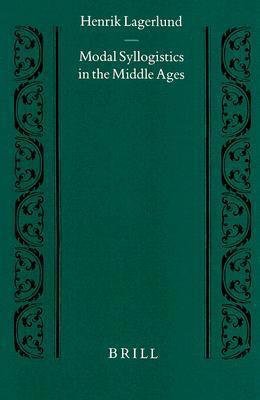
3:16: Did these approaches impact on mental language theories and affect vague terms and singular concepts – and can you say something about medieval logic generally – how does it compare with the contemporary logical landscape?
HL: Mental language as it was developed by William Ockham seems to have been a kind of medieval functionalism serving as both psychological entities caused by our interaction with our environment and as linguistic entities in a language – the language of thought, which underlies all spoken and written languages. These concepts, which is what he calls the entities fulfilling these functions, also serve as the basic terms of logic. The terms that make up language and logic are concepts. It is a fascinating theory, which has been studied quite a lot throughout the latter decades of the 20thcentury and the first couple of decades of the 21stcentury.
Less understood is the development after Ockham starting with Buridan. He seems to stress the role of mental language as a psychological theory more that Ockham did. Ockham was always more interested in metaphysics and semantics than in psychology. The idea of vague concepts or terms was introduced to account for how we form concepts from a representational theory of perception. Buridan thought these concepts first formed from perceptions were what he called vague singulars and was best captured by demonstrative expressions like ‘this human’ or ‘this table’. It is from these that more proper singular terms were formed and also universals. As I have interpreted this, a proper singular term is formed by adding circumstances or descriptions to the original vague concept. The adding of descriptions make them more specific while taking them away makes them less specific and universal. It can of course be criticized for not really being a theory of singular concepts since descriptions no matter how many you add will always lack that direct link with the thing it is describing, which a causal theory will have. Ockham’s theory is usually interpreted as a causal theory.
Medieval logic is hard to summarize or comment upon in only a few sentences. As is often said there are three great periods in the history of western logic, the ancient, the medieval and the contemporary starting with Frege. I usually say that there are three great logicians in history, Aristotle, Buridan and Frege. The main representatives of these three periods. Buridan wrote Summulae de dialectica, which is one of the greatest logic books ever written. Even though the basis of medieval logic is Aristotelian it goes well beyond Aristotle, but since it is Aristotelian it is not symbolic like contemporary logic and it is not connected with mathematics like contemporary logic, but more connected to language. If any one doubts the sophisticated nature of the kind of logic, for example, Buridan developed, I recommend that they read Terry Parsons Articulating Medieval Logic (OUP).
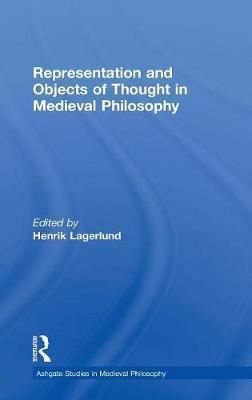
3:16: You’ve looked at the way representation has been treated throughout medieval philosophy and in particular the distinction between epistemological problems and descriptive problems. Can you first set out the terrain – what’s the distinction about and was it something pretty much accepted and used by the medievals? Avicenna seems a key philosopher here isn’t he?
HL: Yes, I think this distinction is important to keep in mind. It is not new with me, of course. Richard Rorty and Anthony Kenny have both used it to make certain points about the history of philosophy. I use it to make sense of certain developments during the middle ages. Aristotle as well as his main followers in medieval times tended to ignore the distinction or refuse to draw it. In some sense one can then say they were not really concerned with epistemology as we are today. Aristotle describes a process of knowledge acquisition, but he is not concerned with giving a justification of this process or explain how this process justifies some claim about the world. The process itself is what guarantees the truth or necessary truth of the claim and as such it accounts for knowledge or episteme. Even though a descriptive philosophical psychology can be said to proceed throughout the middle ages, there is a gradual concern for epistemological problems and about how we can justify these claims being made about cognition and knowledge. It starts to slip into philosophy more and more from the late 13thcentury into the 14thcentury. It is very clear by the early 14thcentury that justification of knowledge claims is now a worry and also at the same time skepticism is a worry.
I think Avicenna is an important thinker in this sense, because he seems to me aware of the distinction. He brings to the Aristotelian tradition some new and interesting epistemological ideas such as conceptualization and assent. They move or push the Aristotelian idea of knowledge towards something new where warrant and justification comes into play more explicitly. This can be seen in the book Knowledge in Medieval Philosophy, which I edited (Bloomsbury).
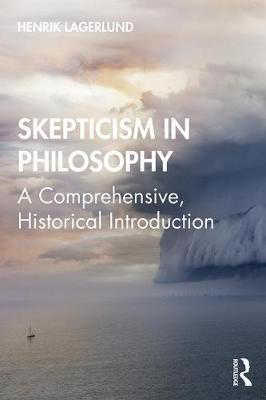
3:16: Contemporary philosophy has been interested in skepticism but it’s not based on this approach to representation isn’t it? Is this one reason why you’ve written about the history of skepticism, starting with Pyrrho so that you can show how important this epistemological/descriptive distinction is? When did skepticism become tied up with knowledge in a way that we might recognize today? Was it Augustine who started this strand of skepticism, and was it religious disputes between Arabic, Islamic and Jewish informed philosophy that propagated and took it forward?
HL: You are right, my interest in skepticism derives partly from my interest in this distinction and how it plays out in the middle ages. It can be said to be an interest in how the other side, the epistemological/non-Aristotelian side, developed. As I emphasize in Skepticism in Philosophy (Routledge), Augustine is an important figure here, since he for whatever reason starts to talk about knowledge in a more explicit way in relation to skepticism than anyone before. As I understand the ancient discussion of skepticism it was mostly about beliefs and whether we can have true beliefs about the world. The stoic idea of katalepsis applies to beliefs and it is that that the Academics criticize. Augustine’s worry is instead about knowledge and his way of looking at it seems to have prevailed. He is also the one that applies the term doubt to describe a skeptic, which was not done in ancient time – at least that is not how Sextus and Cicero seem to think about skepticism. He also brings the concept of certainty into this discussion and defines it as where there is no doubt and vice versa. In the late 13thcentury the debate about knowledge and skepticism between Henry of Ghent and John Duns Scotus plays an important role as well. It is after that debate that we see questions and discussions of the status of knowledge claims in Posterior Analytics commentaries, which before that had not contained anything like this. It is then one can see the distinction play out in full force.
I am also interested in the history of skepticism because I think there has been a perspective lacking from such a history for a very long time, namely the medieval perspective. The only way I could introduce that in a way that would give it real impact was as part of a general history of skepticism. It cannot then be forgotten and left out. One can also then see how interesting it is and how original the medievals were. It seems clear to me that later skepticism would not have been what it is without the medieval perspective.
3:16: How important is Buridan’s ‘fallibilism’ in this tradition, especially for the development of scientific knowledge?
HL: I think Buridan’s fallibilism played a hugely important role for the development of philosophy. There were other ways to block the overarching skepticism of divine deception, a global external world skepticism, but none that was only philosophical. The others were to some extent mainly theological. Descartes own solution is now considered philosophical but it was also a theological solution, which was also used by several medievals. Buridan’s way of doing it was solely motivated by philosophical considerations and the ingenious move of using fallibilism as an anti-skeptical position - one I think we thought we were first with in the late 20thcentury.
This allowed philosophy to move on virtually unconcerned with external world skepticism. It was really only when Buridan over 200 years later had been forgotten for various reasons that it came back. I would like to write a book detailing how that happened. It would be fun.
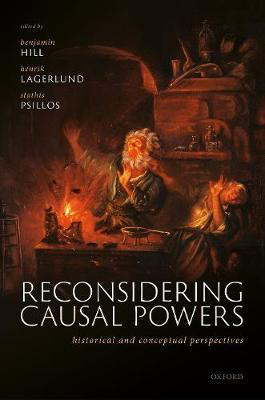
3:16: I guess we’ve all heard of Hume and Kant and Reid and their skeptical positions, but I hadn’t hear about Lady Mary Shepherd. What’s her contribution?
HL: Yes, I don’t only bring her up because I felt I needed to have a woman in my history of skepticism. On the contrary, I think she is incredibly interesting. She wrote several books in the early 19thcentury against Hume in particular but she is also an original systematic thinker in her own right. She sees with worry developments in early 19thcentury Scottish philosophy which become more and more friendly to Hume. She sees him as a skeptic and an atheist. Her background is partly Berkeley so those views were particularly sensitive to her. In one of her works, Essay Upon the Relation of Cause and Effect from 1824, she rejects Hume’s account of causality and develops her own account, which partly has causality grounded in reason. In a second book, Essays on the Perception of an External Universe, and Other Subjects Connected with the Doctrine of Causation from 1827, she among other things develops an argument for knowledge of an external world and against skepticism. You cannot write the history of British philosophy from that period and ignore her.
3:16: And where are philosophers today regarding skepticism – and outside of philosophy there’s the rise of ‘fake news’, conspiracy theorists and other skepticisms. Has philosophy got anything to say about this rise of non-philosophical skepticism? Do you think if contemporary philosophers had taken a broader view of representation philosophy would have a different take on skepticism and are there strands of contemporary philosophy that strike you as getting back to the dual stranded approach to representation? Might Wittgenstein, for example, be better understood if we consider his medievalism?
HL: Unfortunately, I think contemporary epistemology has been a little bit too preoccupied with itself. It has largely ignored its history and it has ignored the public domain. There is a strong need for more philosophers to engage with the public. Skepticism is a case in point. Skepticism outside of philosophy is foremost in some way or another related to science. I distinguish three kinds of such skepticism in my book, namely two kinds of science skepticism and skepticism towards scientific consensus. The two kinds of science skepticism both take their basis in science and express skepticism toward first of all pseudo-science but also towards science itself as part of the scientific method. Skepticism towards scientific consensus is for example climate skepticism and Anti-Vaxxers. They doubt or even reject scientific consensus. There is an interesting relation between this kind of skepticism and so-called knowledge resistance. As I see it skepticism, or at least this kind of skepticism, gives rise to a resistance to knowledge that is alarming and dangerous for western democracy. We see it on full display in the world today with COVID-19, particularly in the US.
Epistemology and philosophers working in that area could do a lot on the public stage to dispel some of the worst confusions and dangerous views out there. At least that is my hope. A more cynical voice inside me worries that people have stopped listening to each other and there is no talking or argumentation that will help any more.
To answer your last question, I think the distinction I talked about above between a descriptive and an epistemological view of mind or representation is Wittgenstein’s. I think there are aspects of medieval philosophy that he would feel comfortable with – then there are parts he would clearly reject as well.
3:16: And for the readers here at 3:16, are there five books you could recommend that will take us further into your philosophical world?
HL: As I mentioned already I was drawn into philosophy through a book by G.H. von Wright called Vetenskapen och förnuftet (“Science and Reason”) (Bonnier, 1986). He writes that he had mainly two motives with the book, namely to understand the basic features of the worldview that modern science gives us and to understand its implications through technology on life. I was mainly drawn to his way of using history to understand our contemporary world. It had a bigger impact on me that I originally thought. I am sorry the book was never translated to English. I have written two blog entries on the Rotman Philosophy Blog about the book (Part 1: Science and Reason and Part 2: The Myth of Progress).
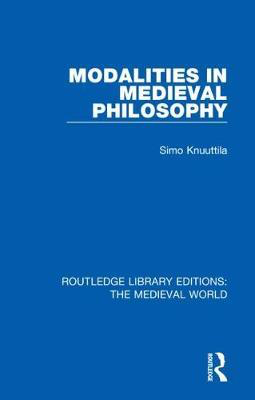
Before I started to work on my dissertation, Simo Knuuttila published Modalities in Medieval Philosophy (Routledge 1993). It became absolutely central to my work on medieval modal logic. In some sense, it was also the model for my own book on modal syllogistics. He lays out the history of modal concepts throughout the middle ages. It is also in this book that he develops the much-discussed idea that John Duns Scotus introduced the concept of logical possibility and started to evaluate modal sentences using synchronic alternatives, that is, as p is true now, not-p is possible at the very same time.
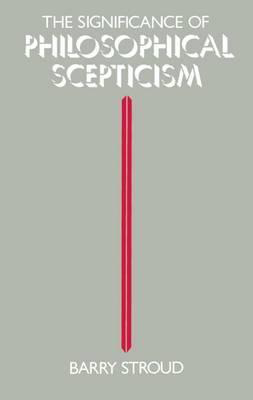
My interest in skepticism was piqued to a large extent by my early encounter with Barry Stroud’s well-known book The Significance of Philosophical Scepticism (Oxford University Press, 1984). I write about it in my book on skepticism. I was deeply impressed by how seriously he took the problem and how seriously he took historical problems for present day philosophy. Before his book, Descartes’ problem was only a problem for a historian – a problem that Moore and Wittgenstein had solved. He made skepticism a pressing problem again that philosophers must address.
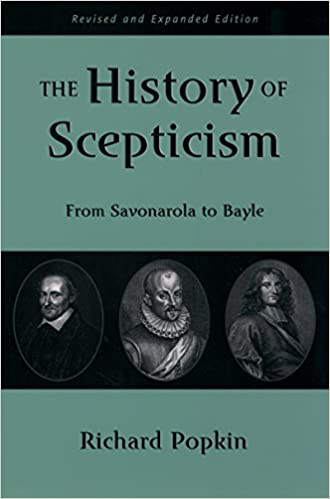
I have to include Richard Popkin’s groundbreaking work The History of Scepticism from Savonarola to Bayle (Oxford University Press, 2003). He brought skepticism back into historical scholarship and he revolutionized the study of early modern philosophy. His work changed the way we do history of philosophy. I am somewhat critical of his general thesis and his claims of a ‘crise pyrrhonienne’ in my book, but this takes nothing away from his achievements as a historian of philosophy and skepticism.
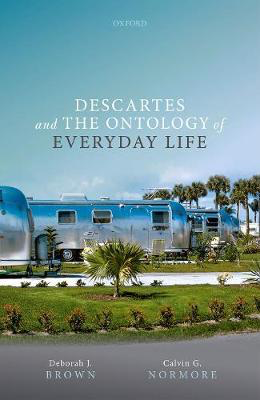
There are many books I would like to mention and I am having a hard time picking which one I should mention, but I will pick one of my absolute favorite reading experiences of late, namely Deborah Brown and Calvin Normore’s Descartes and the Ontology of Everyday Life (Oxford University Press, 2019). Besides giving the reader an introduction to Descartes view of the world, it also argues for a new and bold Descartes that does not only carve up the world into mind and body, but posits several irreducible composites. It is a very original work in the history of philosophy.

ABOUT THE INTERVIEWER
Richard Marshall is biding his time.
Buy his second book here or his first book here to keep him biding!
End Times Series: the index of interviewees
End Time series: the themes
Huw Price's Flickering Shadows series.
NEW: Steven DeLay's Finding meaning series